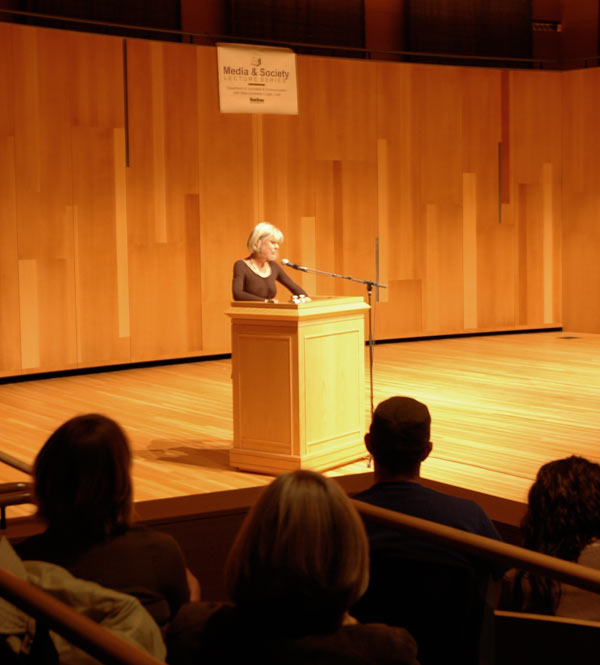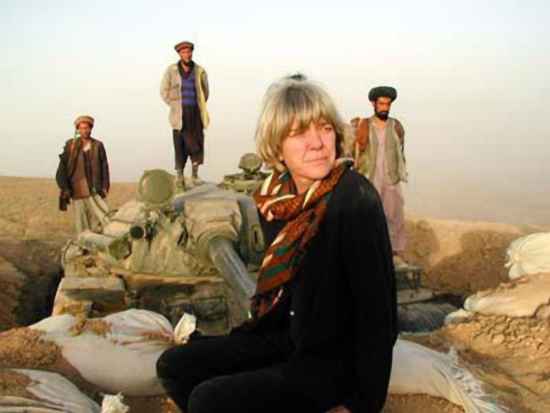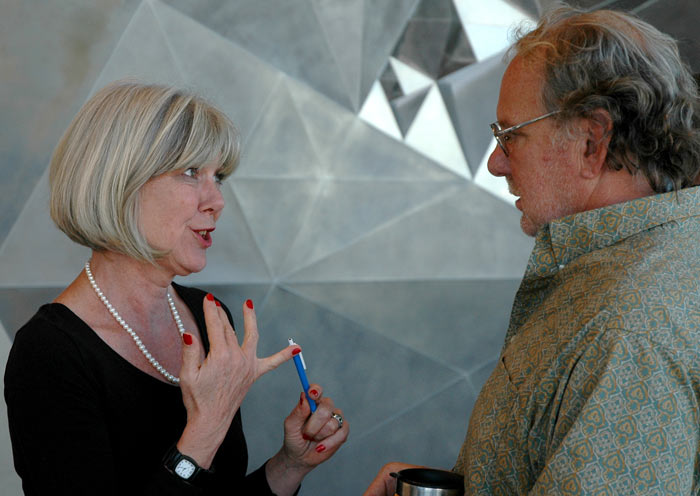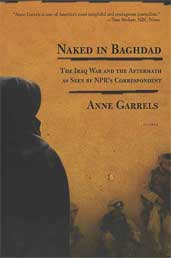NPR reporter mourns ‘dying breed’ of foreign reporters on the ground to ‘bear witness’
November 8th, 2010 Posted in OpinionBy Storee Powell
LOGAN—A new animal has joined the worldwide endangered species list: foreign news correspondents, National Public Radio’s Anne Garrels said Thursday at USU’s Performance Hall.
 Garrels, a 30-year foreign correspondent who covered both Iraq wars, focused on the importance of the “dying breed” of international journalists in an address titled, “Bearing Witness: One journalist’s take on covering the world.”
Garrels, a 30-year foreign correspondent who covered both Iraq wars, focused on the importance of the “dying breed” of international journalists in an address titled, “Bearing Witness: One journalist’s take on covering the world.”
Garrels appeared as a guest of Utah Public Radio and the Morris Media and Society Lecture Series, sponsored by USU’s Journalism and Communication Department.
“You are looking at a Neanderthal,” Garrels told an audience of about 400. “I am not a commentator, I don’t shout. I do report on the life and death of Americans.”
Without reporters on the ground to “bear witness” at important events like wars and battles and “human moments,” Garrels said, the rest of world may never learn of them. The loss of U.S. journalists and news bureaus oversees means that there is no one there to make Americans aware of atrocities, tragedies and human triumphs.
• RADIO INTERVIEW: Click here for her hour-long interview with Tom Williams on Utah Public Radio.
• RELATED STORY: Garrels offers students insights from 30 years covering the world.
 Since the late 1970s, Garrels has served as a diplomatic and war correspondent in Iraq, Afghanistan, Pakistan, El Salvador, and the former Soviet Union, from which she was expelled in 1982 by the Soviet government for being a “spy.” She has reported for ABC and NBC news, NPR and worked in the U.S. State Department.
Since the late 1970s, Garrels has served as a diplomatic and war correspondent in Iraq, Afghanistan, Pakistan, El Salvador, and the former Soviet Union, from which she was expelled in 1982 by the Soviet government for being a “spy.” She has reported for ABC and NBC news, NPR and worked in the U.S. State Department.
Budget cutbacks for foreign news coverage means there is less eye-witness reporting for “on the ground,” Garrels said.
“We need experienced witnesses around the globe, but funding is a huge problem,” Garrels said.
In 1988, Garrels joined NPR and was one of only 16 U.S. reporters to remain in Baghdad when U.S. and its allies invaded Iraq 2003. During the U.S. “shock and awe” bombing of Baghdad, it was a “strange group” of U.S. news organizations left behind to “bear witness,” Garrels said. U.S. TV news networks had pulled their reporters out, she said, leaving behind reporters from The New Yorker, The New York Times Review of Books, NPR and others.
Over six years reporting from Iraq, Garrels worked as both an embedded and unembedded journalist. Although many criticize embedded reporters for being “too jingoistic” in support of the military, Garrels said one approach is not necessarily better than the other—each provides a different perspective.
Nine years after the U.S. invasion of Iraq, Garrels said she still feels guilty for not asking tough enough questions. The news media—herself included—failed the American people, Garrels said.
 “Americans don’t like questions that make them uncomfortable,” she said. “We should have asked more questions, including journalists like myself, when we were entering Iraq.”
“Americans don’t like questions that make them uncomfortable,” she said. “We should have asked more questions, including journalists like myself, when we were entering Iraq.”
Too many journalists now focus on technology and equipment rather than learning how to ask good questions. It is a “cautionary tale for journalists” to realize that technology will change, but that having something to say, saying it well and asking good questions should not change, she said.
In some instances, technology and its growing availability can be dangerous for journalists, Garrels said. “Terrorists use the web now, and they will Google you,” she said.
For that reason, “journalists can’t hide” from potential kidnappers in war zones—a rising danger in recent years—by claiming that they’re not American.
“Wikipedia almost got me killed,” Garrels said, because a blogger from the Arab news network Al Jazeera kept adding a line to her Wikipedia bio that said her security detail had killed innocent Iraqis. She didn’t have a security detail in Iraq, she said, and certainly none of her staff had ever killed Iraqis.
After removing the false statement from her bio several times, she had to ask the president of Wikipedia to have it permanently removed, Garrels said.
“It was not true, and therefore insulting, and much worse, it was dangerous,” she said.
Garrels, who spent six years in Iraq as NPR’s bureau chief, said she stayed one year too long. Garrels said she drank to cope with the sorrows that come from “bearing witness” in a war zone, and that she became “loopy” worrying about keeping herself and her staff safe.
Why did she stay so long? Garrels said that making phone calls is no replacement for reporting from the ground.
 “You can only experience the joy of hanging out by being on the ground,” she said. “This is how I found the best stories, things I never could have imagined” or uncovered by depending on phone interviews from the safety of London or Washington.
“You can only experience the joy of hanging out by being on the ground,” she said. “This is how I found the best stories, things I never could have imagined” or uncovered by depending on phone interviews from the safety of London or Washington.
Garrels attributes much of her reporting success to her Iraqi driver and “fixer.” She said she tried but failed to get him out when she left Iraq. She has not heard from the driver in five months, and is worried about his safety.
For their own safety, many Iraqis didn’t tell even their families that they were working for U.S. news organizations, so Garrels paid her driver herself. But because he had not been working for NPR, he was denied permission to leave Iraq for the U.S. under the provision that provided protection only to Iraqis who assisted the U.S. government and media.
“He will probably get out alive,” Garrels said. “Because of him, I was able to give an accurate report on Baghdad.”
An example of that reporting came shortly after Baghdad had fallen, and U.S. media reported images of Iraqis pulling down a huge stature of Saddam Hussein. Garrels said there were only a few Iraqis trying to take the statue down, but there were not enough to do the job.
“Most of the Iraqis present were looking fearfully at the U.S. military that had to take down the statue, but this is not how most of the major networks depicted this,” Garrels said. “Being on the ground allowed independent reporting.”
Other such incidents Garrels said she reported included stories on the credentials of military leaders and military contractors, and the torture of captured Al Qaeda members. She said she could meet with the victims, and witnessed growing sectarian violence that many military leaders did not know about.
“This violence made it hard to be on the ground because I had the problem of protecting my staff,” Garrels said.
The violence experienced by Iraqis and Afghanis after years of war could be all for naught, or could serve as a lesson, Garrels said. The take-home lesson of the current U.S. wars in Iraq and Afghanistan is for journalists and Americans to learn that we need to keep asking tough questions.
“Our learning curve has been extremely steep,” she said. “The situation in Iraq now is very tenuous. If we don’t learn to ask better questions, it will all be very tragic.”
TP
Tags: Anne Garrels, Iraq, Morris Lecture, NPR

2 Trackback(s)
Sorry, comments for this entry are closed at this time.